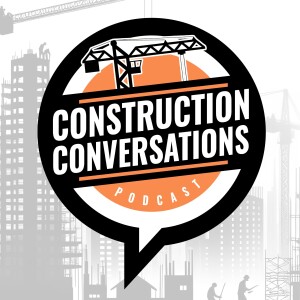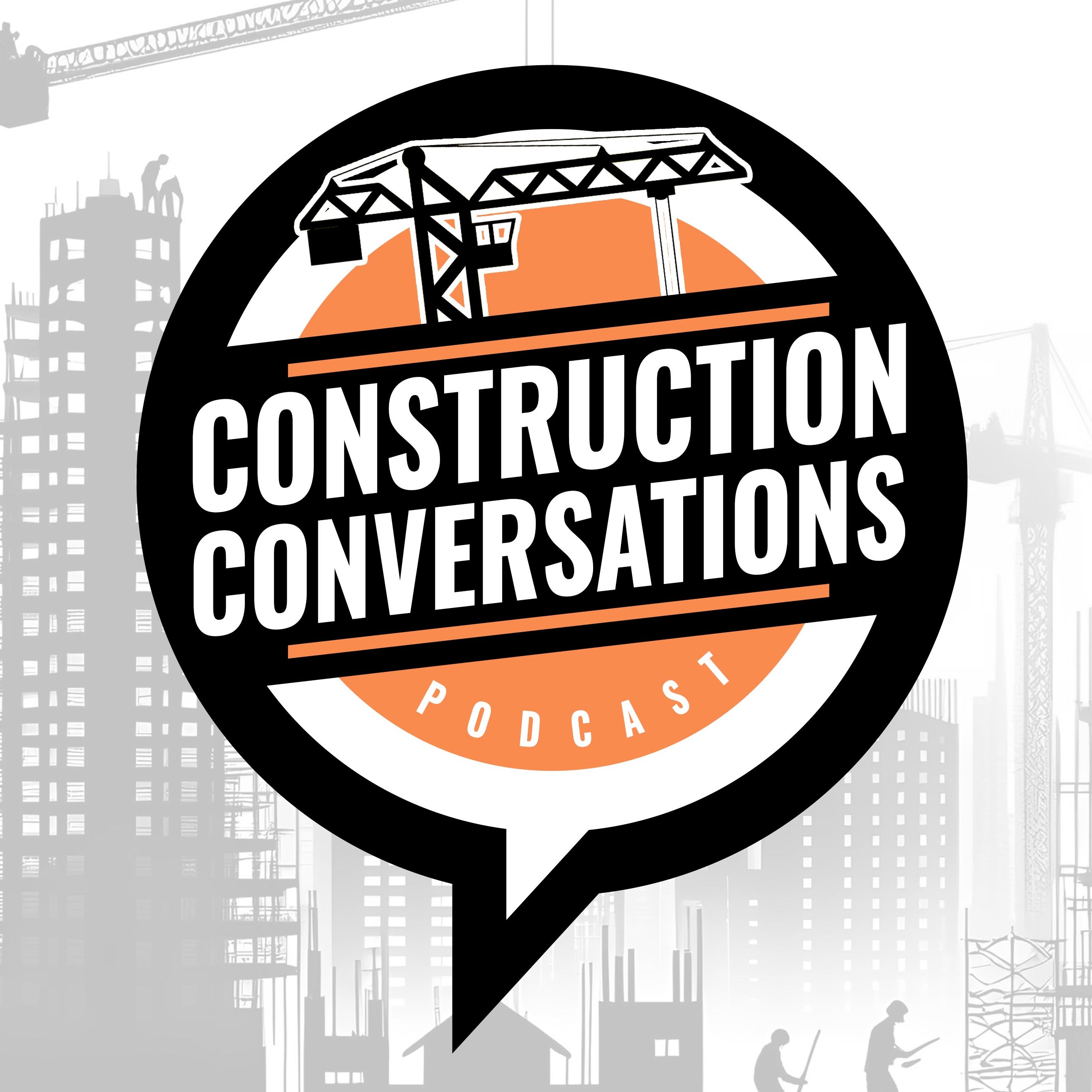Episodes

Wednesday Mar 12, 2025
Wednesday Mar 12, 2025
In this engaging episode of 'Construction Conversations,' hosts Stephen and Lars sit down Chris Massey, Senior Superintendent from Ellis Don, to explore the evolution of a career in construction. Chris reflects on his childhood aspirations and the journey that led him to become a leader in the industry, emphasizing the impact of a construction background and the critical role of on-the-ground experience.
The discussion dives deep into the industry's resistance to technology adoption, juxtaposed with the recent acceleration due to circumstances like the COVID-19 pandemic. Chris shares personal insights on the importance of tech in modernizing workflows and improving efficiency, while retaining the essential human element in construction planning. He highlights how Ellis Don stays ahead by adopting new technologies and fostering a culture of innovation.
Furthermore, Chris emphasizes the significance of meticulous planning in construction projects, offering a glimpse into his planning strategies that ensure project success. The episode also sheds light on the value of mentorship, the necessity of effective communication, and the joy of overcoming challenges collaboratively, providing a rich narrative on navigating the future of construction.
Takeaways
- Chris Masse grew up in a construction background and always wanted to pursue it.
- Field surveying as a good starting point for a construction career.
- How COVID accelerated the adoption of technology in the construction industry.
- EllisDon aims to stay ahead of the curve in tech adoption.
- Planning is crucial for efficiency in construction projects.
- Communication and collaboration are key to successful project management.
- Mentorship plays a significant role in professional development in construction.
- Young professionals should focus on learning from field experiences.
- Creating a fun work environment enhances team productivity.
- Technology should complement human effort, not replace it.
Chapters
00:00 Introduction to Construction Conversations
02:18 Chris Masse's Journey in Construction
04:55 Tech Adoption in Construction
07:34 The Impact of COVID on Tech Usage
10:16 Ellis Don's Approach to Technology
13:01 Pilot Projects and Tech Partnerships
15:46 Transforming Project Management with Tech
18:24 Enterprise-Wide Tech Adoption Challenges
21:11 The Value of Time in Construction
23:58 Creating a Culture of Innovation
26:51 The Future of Tech in Construction
29:29 The Role of Technology in Construction
31:08 Balancing Efficiency and Morale in Tech Adoption
34:33 Planning as the Key to Efficiency
44:34 Integrating Technology with Construction Planning
44:50 The Future of Construction Technology
46:13 Advice for the Next Generation of Superintendents
54:07 The Importance of Mentorship in Construction

Tuesday Feb 18, 2025
Ep. 10 - VP of Partnerships - Rethinking the GC Model with Hammad Chaudhry
Tuesday Feb 18, 2025
Tuesday Feb 18, 2025
In this episode of Construction Conversations, hosts Stephen and Lars Herman are joined by Hamad Chaudhry, a seasoned expert in construction innovation and technology. Together, they delve into the pressing challenges facing the construction industry in the US and Canada, including technology integration, labor issues, and cultural shifts.
The discussion sheds light on how traditional construction methods are falling short and explores ways in which leadership and innovation can bridge these gaps. They also touch on the importance of fostering a collaborative environment, where new technologies like AI and BIM play a pivotal role in improving efficiency and project management.
This episode offers valuable insights for industry professionals looking to understand and navigate the evolving construction landscape, emphasizing the need for a paradigm shift in leadership, culture, and technology adoption.
Chapters
- 01:27 State of the Construction Industry
- 05:11 Leadership Challenges in Construction
- 07:36 Attracting the Next Generation to Construction
- 11:50 Cultural Perceptions of Construction Careers
- 16:57 Innovation in Construction: Opportunities and Gaps
- 20:30 Defining Abundance in Construction
- 23:00 Time as a Critical Resource
- 26:12 Bridging the Gap Between Management and Project Delivery
- 34:22 Rite of Passage in Engineering
- 35:00 Team Dynamics vs Project Management
- 36:33 Envisioning the Future of Construction
- 38:34 The Importance of Ground-Level Perspectives
- 40:53 Reevaluating the Construction Paradigm
- 42:15 Vision, Culture, and Leadership in Construction
- 43:51 The Basics: Missed Opportunities in Construction
- 44:04 Innovation and Margins in Construction
- 46:41 Decoupling Information for Field Efficiency
- 48:05 Incentivizing Collaboration in Construction
- 49:22 BIM Adoption and Digital Coordination
- 51:26 Aggregating Projects for Better Outcomes
- 53:05 Mentorship and Hard Work in the Industry
- 54:05 Tech Tools for Efficiency
- 58:14 AI and Meeting Efficiency
- 01:00:34 Connecting with Hammad Chaudhry

Friday Dec 20, 2024
Friday Dec 20, 2024
Join us in this exciting episode as we sit down with Ralph Montague, director at ArcDocs and co-founder of the BIM Coordinator Summit, for an insightful discussion on Building Information Modeling (BIM) in 2024. Ralph shares his perspective on the current state of BIM across the globe, highlighting the disparities in adoption and the key drivers behind its implementation, particularly in Europe.
Dive into the challenges faced by various sectors and regions, and explore the potential solutions provided by technology and standardization in the construction industry. Ralph sheds light on the role of international communities like BIM Heroes in promoting standardized practices and knowledge sharing, while discussing the critical importance of cross-discipline and cross-region collaboration.
Discover how advanced technologies such as AI and blockchain are influencing BIM workflows and reshaping the future of construction. Ralph provides fascinating insights into the psychology of the industry and the necessity for changes in procurement models to optimize productivity. Don't miss this thought-provoking conversation on the evolving landscape of BIM and the innovative practices paving the way forward.
Takeaways
- BIM adoption varies significantly across regions, resembling a two-state country.
- Productivity and sustainability are key drivers for BIM adoption in Europe.
- Standardization of practices is crucial for small companies operating in multiple regions.
- Global conversations about best practices in BIM are essential for progress.
- Construction often operates with incomplete designs, leading to inefficiencies.
- Manufacturing principles can greatly improve construction processes.
- Fragmentation in the construction industry hinders effective collaboration.
- AI and blockchain have the potential to revolutionize BIM workflows.
- BIM Heroes serves as a community for sharing knowledge and experiences.
- Technology should enhance human productivity rather than replace it.
Chapters

Saturday Dec 07, 2024
Saturday Dec 07, 2024
In this engaging episode, join us as we sit down with Michael Pink, founder of SmartPM, to explore his unique journey from celebrating Thanksgiving in Georgia with his family to revolutionizing the construction industry through data-driven scheduling. Michael shares personal anecdotes about family traditions and cultural insights with a focus on the importance of optimizing processes in construction projects. Discover how his background in industrial engineering and early experiences at KPMG laid the foundation for creating innovative solutions that aim to improve efficiency and avoid costly delays in construction projects.
Dive into discussions about the evolution of SmartPM from its conceptual beginnings to a full-fledged technological platform that seeks to empower contractors by providing real-time analytics and improving scheduling efficiency. Michael explains the challenges faced by the construction industry and how SmartPM's approach in education and innovative technology is helping bridge gaps in scheduling expertise. This episode sheds light on the future of construction tech, the impact of artificial intelligence on project management, and the ways in which companies can better navigate the nuances of technical scheduling to achieve on-time, on-budget project completion. Tune in to gain valuable insights into tackling the complexities of the construction world through smart scheduling solutions.

Wednesday Sep 25, 2024
Ep. 07 - Executive - Insights and Innovations in Prefabrication with Andrew Rener
Wednesday Sep 25, 2024
Wednesday Sep 25, 2024
Welcome to Construction Conversations! In this episode, we are delighted to host Andrew Rener, an executive team member at Architectural Metals and an expert in prefabrication. Join us as Andrew shares his journey into the construction industry, from his family's roots in construction to his current role as a prefab specialist.
We delve into the evolution of prefabrication, discussing its current state, challenges, and the potential for future growth. Andrew offers a unique perspective on how prefab can address labor shortages, improve efficiency, and drive value in construction projects.
Additionally, we explore the importance of mentorship in the industry, the role of technology and AI in construction, and how emerging innovations can make the field more attractive to the next generation of professionals.
Whether you're a construction veteran or new to the field, this episode provides valuable insights into the transformative power of prefabrication and technology in the construction industry. Don't miss it!
Chapters

Sunday Sep 15, 2024
Sunday Sep 15, 2024
Join us as we sit down with Chris Wilocki, Director of Electrical VDC at VIATechnik, to explore the evolving landscape of construction careers and the pressing issue of mental health within the industry. Chris shares his personal journey from a high school graduate entering an electrical apprenticeship to his current role, highlighting the diverse opportunities within the field. We delve into the impact of BIM technology on construction projects, discussing its benefits and challenges. The conversation also addresses the mental health crisis in construction, examining the factors contributing to high stress levels and the importance of redefining the value and perception of construction work. Tune in for an insightful discussion on navigating careers and fostering well-being in the construction industry.

Friday Aug 16, 2024
Friday Aug 16, 2024
In this episode, we are joined by Mitch McDonald, General Superintendent at XL Construction, as he shares his fascinating journey from a third-generation construction family to leading major projects. Mitch dives into his early life, growing up on a dairy farm, and how those experiences shaped his work ethic and career in construction.
We explore Mitch's rapid rise in the industry, his transition from field to office roles, and the invaluable lessons learned along the way. He offers insightful advice on balancing work-life rhythms, the importance of mentorship, and how young professionals can navigate their careers in construction.
Mitch also discusses the future of the construction industry, emphasizing the critical need for skilled labor and the potential career paths for those entering the field. This episode is packed with wisdom and practical guidance for anyone interested in or already part of the construction industry.
Takeaways
- Raising your hand and asking for opportunities is key to career progression.
- A successful superintendent guides the collective effort of the team rather than directing or ordering.
- Managing people older than you requires respect, engagement, and utilizing their experience and knowledge.
- Work-life balance can be challenging in the construction industry, especially in the early stages of career advancement. Prioritizing family and personal well-being is crucial for achieving work-life balance.
- Individuals should take ownership of their own development and seek resources that resonate with them.
- Apprenticeship programs in the construction industry offer high salaries and the potential for early retirement.
- Communication and outreach are key in attracting young people to the construction industry.
Chapters

Thursday Jul 18, 2024
Thursday Jul 18, 2024
Join Stephen as he sits down with Lars Herrmann, a trailblazing founder in the construction industry, known for his candid insights and fearless approach to innovation. In this episode, Lars shares his journey from the Navy to founding Hermann Construction, tackling industry inefficiencies, and the evolution of construction technology. Discover how Lars' military background honed his leadership and communication skills, and how these experiences have shaped his approach to scaling a successful construction business.
Explore the challenges and opportunities within the construction sector, from the disconnect between the field and the office to the role of technology and AI in transforming traditional practices. Lars offers a unique perspective on creating a culture of accountability, the importance of standardization, and the potential of decentralized growth. This conversation dives deep into the practical and philosophical aspects of driving industry change, making it a must-listen for anyone passionate about the future of construction.

